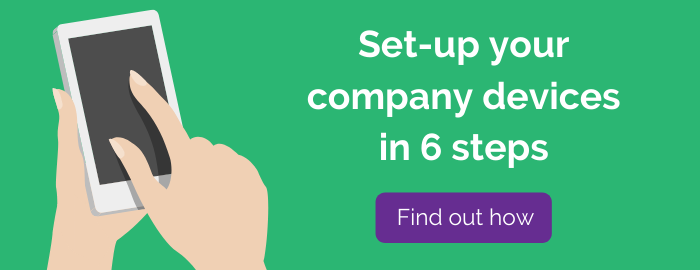All of the business advantages unlocked by mobility are provided by the power of today’s handheld devices - whether it’s a smartphone, tablet or special purpose device.
A typical consumer smartphone in 2018 has more processing power than some of the world’s most advanced supercomputers could offer in the 1990s. They have fundamentally changed the way mobile operations are able to be managed, providing smarter, faster and safer processes.
The challenge for any business which relies on mobile workers is to work out the best way to harness these advantages, particularly when it comes to equipping a workforce with the digital tools they need.
With around 96 percent of adults now owning a smartphone, a common approach is to adopt a BYOD (bring your own device) policy. This permits employees to use personal devices for work purposes.
But is this the right approach for your business?

Pros and cons of a BYOD approach:
- Pro - Cost
- Pro - Latest tech
- Pro - User experience
- Con - Company control
- Con - Security
- Con - Administration
Pro - Cost
The potential financial savings to be made are the main selling point of BYOD. It reduces the financial burden of having to purchase a quantity of devices, along with the associated costs of maintenance, repairs and support.
With technology advancing so rapidly, it reduces the risks of investing in a batch of devices that could soon become outdated - unable to handle the requirements of the latest apps and services.
Pro - Latest tech
On average, European smartphone owners upgrade their devices every 21 months. It’s an update rate that many businesses will fail to match when devices are being supplied to their fieldworkers.
A BYOD approach is, therefore, liable to provide employees with a superior level of technology - access to the most capable devices which offer all the benefits of the latest features and functionality.
Pro - User experience
The use of personal devices minimises the need to train your employees how to use a business supplied phone. They will have devices configured and customised to match their exact requirements and personal preferences.
It creates the kind of positive experience for users that’s unlikely to be matched by use of ‘vanilla’ business owned device. Happy employees who feel empowered by the tools they’re using, means increased productivity.
Con - Company control
The convenience of a BYOD policy comes at the cost of the amount of control you have. The multitude of different devices being used throughout a workforce will have different technical specs and be loaded with a variety of different apps.
It creates a chaotic IT environment in which any problems or conflicts can be difficult to identify. It’s a problem which can be effectively managed, however, with mobile device management systems.
Con - Security
With reduced control over devices, it makes managing and monitoring company data more of a challenge. It’s difficult to ensure safe protocols are being followed when individuals have the freedom to set-up devices how they wish.
It’s another area where mobile device management systems are providing a convenient solution. They allow a secure area to be created on employee’s phones which can be remotely managed and controlled.
Con - Administration
Managing costs can become complex when dealing with different devices that use a variety of service and data plans. This is especially the case when trying to make sure that personal and business costs are kept separate.
A neat solution is provided by the increasing availability of dual-sim phones which allow two sim cards to be used within a single device. It’s a simple way to ensure that business and personal costs are kept safely apart.
Ultimately, whether BYOD is right for your business will depend on your organisation’s specific needs and challenges. It’s important, however, not to view it as being a binary choice that needs to be made.
As has been seen, technology is providing innovative ways for more balanced alternatives. Solutions, such as mobile device management, provide the convenience and cost benefits of BYOD while providing the same kinds of control and security you would expect with a corporate device.


